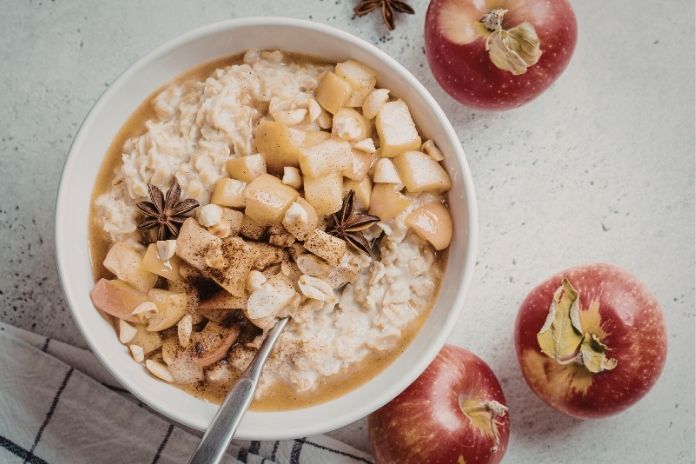Struggling with late-night cravings while dieting? You’re not alone—and the solution could be easier than you think. Rather than eliminating evening snacks, the right foods can help with your weight-loss objectives.
Papaya is one such fruit that’s gaining popularity as a pre-bedtime snack, due to its special combination of digestive enzymes, fiber, and minimal calorie content. It’s light, has a natural sweetness, and helps your body get better sleep and promote digestion.
This article explores whether eating papaya before bed can genuinely support weight loss. We’ll break down its nutritional value, how it works with your digestion and metabolism, the best ways to consume it at night, and who should consider including it in their diet.
Read More: 10 Incredible Health Benefits Of Papaya Leaf Extract
Nutritional Profile of Papaya

Papaya is a tropical fruit that’s as nutritious as it is refreshing. One cup of fresh papaya (about 140 grams) provides:
- Just 60 calories, making it ideal for calorie-conscious diets
- Nearly 3 grams of fiber, supporting fullness and gut health
- About 101% of the daily recommended intake of Vitamin C
- A good dose of Vitamin A, folate, potassium, and powerful antioxidants
- The enzyme papain, known for aiding protein digestion
- Natural sugars that provide sweetness without the blood sugar spikes
Its low energy density and nutrient-dense profile firmly situate it within the category of fibrous fruits that manage weight and support digestive health.
How Papaya Supports Weight Loss
Papaya is a fiber-rich fruit with several additional benefits that support faster weight loss.
High in Fiber
Papaya is known for its rich fiber content. Fiber helps regulate appetite and promote satiety while slowing digestion.
- Helps control late-night cravings
- Reduces mindless snacking and restricts calorie intake
- Supports regular bowel movements, which can have an overall impact on weight
Hence, people often include papaya in their diet to reduce hunger in the evening and stabilize eating patterns.
Aids Digestion
Papain, a natural enzyme in papaya, helps break down protein in the digestive tract.
This makes it easier for your gut to process meals, especially in the evening when digestion slows down.
- Eases digestive burden after dinner
- Promotes nutrient absorption, which is critical for metabolic health
- Reduces bloating and supports a flatter stomach overnight
Due to these properties, papaya is preferred as it promotes digestive health.
Low Glycemic Index
Papaya is a low glycemic fruit, as it does not rapidly increase blood glucose levels. This is particularly significant at bedtime when balanced blood sugar assists in regulating hormones responsible for fat storage.
- Prevents insulin spikes, which are associated with fat storage buildup
- Delivers steady energy throughout the night
- Supports fat metabolism processes that take place during nighttime
This makes it an ideal bedtime weight loss food for people who wish to manage blood sugar or improve insulin sensitivity.
Natural Diuretic Effects
Papaya has very mild diuretic effects, which help eliminate excess sodium and minimize water retention. This is not the same as burning fat, but it can help alleviate digestive discomfort and make you feel lighter in the morning.
- Reduces overnight bloating
- Induces detoxification by way of hydration and digestion
Your metabolism and digestion don’t shut off while you’re sleeping, but they do slow down. That’s because what you consume in the evening becomes more important than ever. Heavy meals can disrupt sleep and lead to weight gain, whereas functional, light foods such as papaya complement your body’s natural clock.
Consuming a fiber-dense, enzyme-packed fruit such as papaya during the evening can:
- Maintain your circadian rhythm and natural digestive process
- Prevent gut overload, allowing you to sleep more comfortably
- Increase overnight metabolic repair and fat breakdown
According to Kolors Healthcare’s article, eating papaya at the right time can enhance digestion and metabolism, particularly when included in a well-balanced routine.
Read More: Digestive Enzymes vs. Probiotics: What’s the Difference and Which One Do You Need?
The Impact of Nighttime Meal Timing
Timing your snacks and meals at night is important to enhance digestion, boost metabolism, and support overall well-being, all essential factors for weight reduction. Your circadian rhythm, or body’s natural clock, determines how efficiently you digest food and burn fat during the day.
Relationship between Circadian Rhythm and Digestion
Your circadian rhythm controls different body functions, such as digestion and metabolism. At night, your body gets ready for sleep, leading to slower digestion. Therefore, eating a heavy or large meal before bed can result in digestive issues. On the other hand, eating light food, such as papaya, can promote better sleep and support fat metabolism.
Consuming Heavy vs. Light Meals Before Sleeping
Heavy, high-fat, or high-sugar foods might cause digestive problems and interfere with your sleep. However, papaya, which is light and fiber-rich, keeps you full and also promotes digestive health. This is due to papain, which reduces bloating and discomfort, aiding in better sleep.
Best Ways to Eat Papaya at Night

Although papaya is easily digestible and low in calories, how you eat it makes a difference.
Smart Tips to Enjoy It:
- Fresh-cut papaya – Simple, convenient, and easily digestible
- Papaya smoothie – Mix with almond milk, cinnamon, and chia seeds for a filling snack
- Papaya with Greek yogurt – Provides protein to stabilize blood sugar
Ideal Portion Size:
Stick to 1 cup (approximately 140 grams) of ripe papaya. This is beneficial for the digestive system without overloading it.

Best Combinations:
- Papaya served with lean fat or protein (such as nuts or seeds) helps promote satiation and regulates blood sugar all night long.
- Papaya with Greek yogurt is another super healthy combination. This combination combines papaya’s digestive enzyme properties with the protein and probiotics in Greek yogurt, all of which support a healthy gut, promote satiety, and regulate blood sugar.
- Papaya, along with chia seeds, also works well. The healthy fat and fiber in chia seeds also slow the absorption of natural sugars found in papaya. This helps you stay full for longer with steady energy, even at night.
What to Avoid:
- Overripe papaya, which can be too sugary
- Sugary toppings, such as honey or flavored syrups
- Combining it with heavy meals, which defeats its light-digesting purpose
These practices ensure you’re getting the most out of this healthy late-night snack.
Read More: 10 Natural Remedies to Boost Digestive Health from the Comfort of Your Home
Potential Downsides or Considerations
Just like most foods, papaya may not suit everyone. A high dose of fiber before bedtime might produce gas or bloating in individuals having a sensitive stomach or IBS patients.
- Unripe papaya contains latex, which can cause allergic reactions.
- Relying solely on papaya for weight loss can be unrealistic—it works best as part of a broader, nutrient-dense diet.
If you’re unsure, start with smaller quantities and observe how your body responds.
Should You Eat Papaya Before Bed for Weight Loss?

Papaya provides a perfect combination of properties that make it ideal as a weight-loss evening snack. It is low in calories and glycemic index, making it perfect for satisfying the sweet tooth without leading to increased blood sugar levels, which is crucial for metabolising fat during the night. It’s also fiber-rich, which keeps you full and prevents unhealthy late-night food cravings.
The presence of papain, a natural digestive enzyme, aids in digestion and protein degradation, reducing the burden of digestion before sleeping. Papaya promotes satiety, which may enhance sleep quality and ease digestive disorders.
Moreover, its slight diuretic action, based on its potassium content, reduces water retention and swelling by morning. The benefits of eating papaya before bed result in a lighter and more refreshing morning start.
Best For:
- Late-night snackers who want a guilt-free choice that suppresses appetite and aids digestion
- Individuals with bloating or irregular digestion, particularly following the evening meal.
- People who have a sweet tooth and wish to reduce processed sugar intake without eliminating desserts.
- Individuals on a low-calorie, whole-food-based weight reduction diet.
When to Skip or Be Cautious:
- If you are allergic to latex, or if you experience oral itching or pain after consuming tropical fruits like papaya.
- If you have IBS or gut sensitivity, particularly when consuming high fiber foods at night
- If you over-snack on fruits, assuming they are “free of calories,” the portion still counts
Read More: SIBO vs. IBS: Understanding the Differences and How to Manage Them
Final Thoughts

If you want a healthy, low-calorie snack that aids digestion and suppresses nighttime cravings, opt for papaya. With minimal calories and sugars, this fruit is rich in fiber, which will keep you full. Papaya also has papain, an enzyme that can break down proteins, relieve bloating, and help in smooth digestion during the night.
It provides a shot of potassium as well, which will quietly decrease water retention and get you up and feeling lighter. Its low glycemic index makes it an option for weight loss that will not interfere with your blood sugar or sleep patterns.
So, is papaya good before bed? Yes—for most people, it’s a gentle, nourishing fruit that supports your body’s overnight rhythms. Stick to about 1 cup, avoid overripe or sugar-laden versions, and pair it with healthy habits. Try it for a few nights and see how your body responds—it might just become your favorite nighttime ritual!
References
- https://www.mendzone.in/blog/papaya-the-tropical-treasure-trove-of-health-benefits/
- https://www.hopkinsmedicine.org/health/wellness-and-prevention/bloating-causes-and-prevention-tips
- https://www.medanta.org/patient-education-blog/the-incredible-benefits-of-eating-papaya-daily-health-weight-loss-and-more
- https://www.kolorshealthcare.com/blog/indian-seasonal-fruits-top-picks-for-each-season-guide/
- https://www.researchgate.net/publication/385244723_The_Benefits_of_Papaya_for_Digestive_Health_and_Weight_Loss
In this Article


















